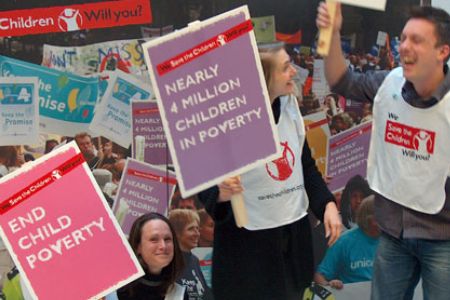UK PM rejects revelation of poverty rise

 The British Prime Minister David Cameron has denied the IFS revelation of poverty increase due to spending cuts, saying that the Autumn Statement would “help families who are struggling”.
The British Prime Minister David Cameron has denied the IFS revelation of poverty increase due to spending cuts, saying that the Autumn Statement would “help families who are struggling”.
He refuted claims by the Institute for Fiscal Studies (IFS) that the British government’s economic reforms support the rich and treat the poor unfairly, insisting that the policies launched in the Statement were asking more of the rich than the poor.
Earlier, the IFS warned the British government’s spending cuts of pushing 600,000 more children into “absolute poverty,” peaking at 3.1 million by 2013.
The IFS, which is Britain’s chief public finance think-tank, revealed that in 2010, 2.5 million children and 2.1 million working-age parents were living in absolute poverty.
The report commissioned by the IFS also slammed the Autumn Statement for decreasing the income of those in the bottom 30% and benefit those in the top 60%.
However, Cameron said, “”If you look at the overall numbers, as I say, the top 10% pay 10 times as much as the bottom 10%.”
In addition, he said there was a “real problem with the way we measure child poverty”.
“It’s the right thing to do to increase the pension: it doesn’t make any child in our country poorer, as you’re giving pensioners more money at a time when they need it, so I think what we’ve got to start doing is measuring how we help children out of poverty, and keep them out of poverty, so one of the decisions we took in the Autumn Statement was to fund nursery education for more two year-olds because it’s things like that, helping young mums get into work because there’s nursery education for their children, that will help get that family out of poverty and keep that family out of poverty, rather than just taking a statistical measure at any one point and asking, well, if you’re putting pensions up you’re making children poor. That doesn’t make sense,” he added.







